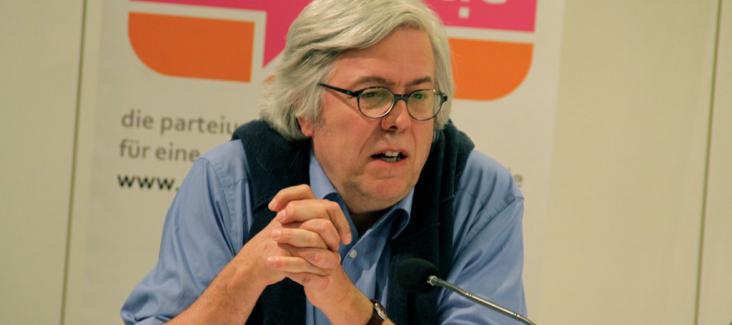Mr. Gross, the AfD has entered the Bundestag. What does that say about the state of democracy in Germany?
This says more about German society than about its democracy. The latter has worked quite well. Through democracy, the great dissatisfaction of many Germans with the prevailing conditions in Germany was clearly expressed. This was also noticeable this summer, when I spent two days at the Baltic Sea and two days in the Black Forest talking to almost 100 voters. Their resentment was palpable. The two governing parties have lost one-fifth of their voters each, while the opposition parties, both within and outside of parliament, have all gained more than they had expected.
Critics accuse the AfD of populism, among other things. Is that per se a bad thing for democracy?
That depends on the definition of populism you embrace. Those who see populism primarily as a form of discourse - simplistic, slightly pandering, affirming the views of "the public", evading difficult questions, searching for scapegoats - will not see this as a bad thing for democracy, especially since there are also populists to the left of the political spectrum and in the middle.
On the other hand, if you look at how J. W. Müller defines populism, where people who think differently don't even belong to your group anymore, foreigners and refugees are to blame for most of the problems we encounter and borders should be closed, then you have to recognize that populism is very undemocratic and even poses many threats to democracy. That is why I consider the notion of populism to be analytically unproductive and I do not like to use it.
I prefer to work with concepts such as national-conservative, nationalist, xenophobic, demagogic, authoritarian, fundamentalist. There are certainly some members of the AfD party that deserve these classifications, but not all AfD voters deserve to be described as such. We also see this with the Swiss SVP, the French Front National, the Vlaams Blok, the FPÖ in Austria or the Danish People's Party.
Skeptics see the success of the AfD as an argument against direct democracy. Are they right?
Certainly not. Do I have to oppose German football just because there are so many football fans among the AfD voters? Only someone who already was sceptical about direct democracy and citizens' initiatives could follow this logic, without really knowing why. Or someone who always had doubts about the political maturity and wisdom of the people, but didn't dare to say it in the past. But now, these people must ask themself why they would still trust the people to elect a Parliament?
No, I think that these election results are an expression of the great dissatisfaction many Germans feel about their circumstances. And I also think that they are an indicator of great dissatisfaction with German democracy. Many people want to be able to express themselves more differentiated and more frequently than once through elections and by choosing between parties, of which not a single one is truly convincing.
Appeal for a larger view of democracy
This election result can be understood as an appeal for the extension of mere indirect democracy to include direct democratic elements. For example, 60% of AfD voters voted for this party because they were disappointed with other parties. With more direct democracy, they would be able to correct the policy proposed by parties more precisely, through referendums. They would not have to vote for AfD, and run the risk of being extremised or misunderstood.
Direct democracy addresses at least three of the biggest problems that have led to the success of AfD: it brings politics and politicians much closer to the citizens, it doesn't leave them to themselves, and proves to them, four times a year, that they are actually heard and are even allowed to decide, i. e. that "the politicians" cannot simply do what they want. But above all, because direct democracy leads to more frequent, differentiated and factual discussions, hundreds of thousands of people will learn more, become more knowledgeable and will be less tempted by misleading slogans and accusations, to elect parties that cannot help anyone.
How should the Germans deal with the AfD and what consequences should we draw from its growth?
First of all, everyone must try to understand why people have voted for AfD. For example, many people wanted to express their criticism of the far too low pensions, or of their fear of being poor and neglected, of living in an area where there is no adequate public transport, no post office, no fast internet and not enough decent work.
Secondly, everyone must try harder to reach out to these people, to listen to them and try to understand their problems. Only afterwards we can try to show them that the AfD does not really address the real causes of these hardships, that the problems aren't really being tackled at the roots.
Thirdly, it is necessary to oppose, contradict and refute demagogic, misleading and hurtful AfD discourse, whether we hear them in the pub, at the club, at a talk show or in parliament.
Links:
More Andreas Gross on direct democracy at www.andigross.ch
This interview was carried out by Mehr Demokratie Nordrhein-Westfalen and published for the first time here.

